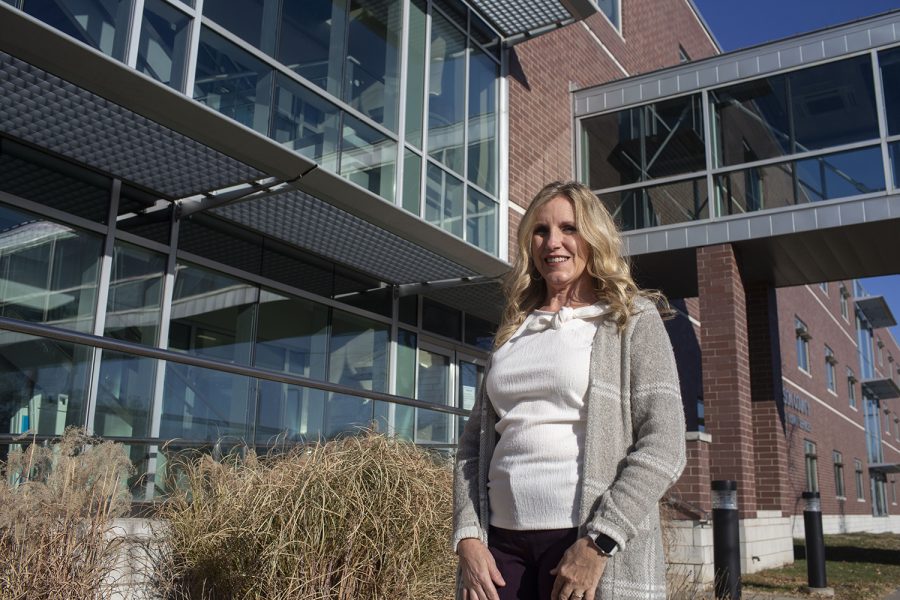Johnson County Social Services proposes raising money for countywide funeral assistance
As local funeral homes continue to provide families services not fully funded by the county, Johnson County Social Services is proposing the county increase funds for funeral assistance.
Johnson County’s Social Services Director Lynette Jacoby poses for a portrait outside of the Johnson County Department of Human Services on Wednesday, Dec. 8, 2021.
December 14, 2021
Johnson County Social Services is proposing more financial assistance for families paying for funeral services, as funeral assistance hasn’t been updated in seven years, said Lynette Jacoby, the Director of Johnson County Social Services.
The current amount of funeral assistance for families in Johnson County is $2,100 for cremation and burial, and $900 for a plot in a cemetery, which comes to a total of $3,000. Social Services is proposing to change this to $2,200 for a cremation, $3,200 for a burial, and $1,000 cemetery which is a maximum of $4,200 in financial assistance.
According to the National Funeral Directors Association, the median cost of a funeral is $7,848.
On the popular crowdfunding website, GoFundMe, there is an entire category for people asking for help to pay for funeral services. The website says that it is “the leader in online memorial fundraising” and claims to have raised $330 million a year for 125,000 memorials.
“The county is giving probably one of the highest amounts in the state of Iowa, there are some counties that have no funds, they will not give any funds,” Michael Lensing, co-owner of Lensing Funeral Home in Iowa City, said. “And in those situations, I don’t know what they do.”
According to Social Services, Johnson County pays more in funeral assistance than other Iowa counties. Linn County only pays $1,000 for a cremation or a burial, and Polk County pays as low as $750 towards cremation only.
RELATED: Funeral home loses ‘pre-need’ license
The assistance comes from the county’s General Assistance program. A family’s household income must be less than 150 percent of the federal poverty line to qualify for funeral assistance.
“Funerals have gone up, they’re really expensive,” Jacoby said. “What’s been happening is, the funeral homes write off a very large portion of the expense for services, they end up donating those costs.”
Jacoby said while families on assistance will still receive funeral services from funeral homes despite not paying the full amount, the funeral homes themselves will be the ones losing money.
Dan Ciha, owner of Gay and Ciha Funeral and Cremation Service in Iowa City, said in most cases, the family does not have many funds to contribute to the funeral.
“We just absorbed that as a loss,” he said. “But, our funeral home’s policy is we still provide services for everyone.”
Lensing said his funeral home also provides funeral services even if the full cost of the services were not paid.
“We tried to give the most respect to the deceased and to follow through and try to get the family through this situation, but we have to work with and only that amount,” Lensing said.
Ciha said the amount of funeral assistance provided by the county does not cover the amount funeral homes generally charge, and it hasn’t for “many years.”
In Johnson County, 108 people have died of COVID-19 from the start of the pandemic, according to the New York Times COVID-19 tracker. Both Lensing Funeral Home and Gay and Ciha Funeral and Cremation Service were overworked with scheduling funerals, the owners said.
“We’ve had probably 90 plus funerals where the death has been some COVID-19 or COVID-19 complications with it,” Lensing said.
Ciha said in the close to five decades he’s worked at the funeral home, he has never seen anything like the COVID-19 pandemic. He said he and his staff have been overworked for the past two years.
Though Ciha and Jacoby say Johnson County should provide more financial assistance, they both agree Johnson County does cover more than other counties.
“We are very fortunate in Johnson County,” Ciha said. “We have some of the best public assistance in terms of not only financial support, but also in terms of professionals helping all these people.”
Lensing and Ciha both said even though the funeral homes aren’t being paid fully by the county, they still donate their services to the deceased and their loved ones.
“The way I look at it is, by us caring for those families that are less fortunate, the more fortunate families will remember them, or members of that family will remember us caring for them,” Ciha said.



